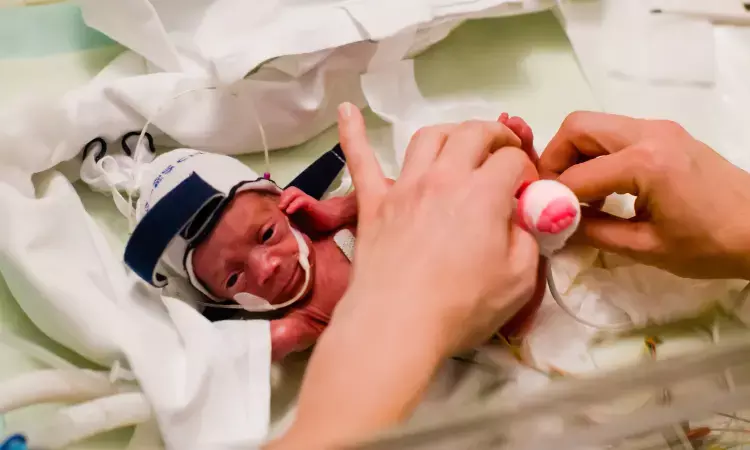- Home
- Medical news & Guidelines
- Anesthesiology
- Cardiology and CTVS
- Critical Care
- Dentistry
- Dermatology
- Diabetes and Endocrinology
- ENT
- Gastroenterology
- Medicine
- Nephrology
- Neurology
- Obstretics-Gynaecology
- Oncology
- Ophthalmology
- Orthopaedics
- Pediatrics-Neonatology
- Psychiatry
- Pulmonology
- Radiology
- Surgery
- Urology
- Laboratory Medicine
- Diet
- Nursing
- Paramedical
- Physiotherapy
- Health news
- Fact Check
- Bone Health Fact Check
- Brain Health Fact Check
- Cancer Related Fact Check
- Child Care Fact Check
- Dental and oral health fact check
- Diabetes and metabolic health fact check
- Diet and Nutrition Fact Check
- Eye and ENT Care Fact Check
- Fitness fact check
- Gut health fact check
- Heart health fact check
- Kidney health fact check
- Medical education fact check
- Men's health fact check
- Respiratory fact check
- Skin and hair care fact check
- Vaccine and Immunization fact check
- Women's health fact check
- AYUSH
- State News
- Andaman and Nicobar Islands
- Andhra Pradesh
- Arunachal Pradesh
- Assam
- Bihar
- Chandigarh
- Chattisgarh
- Dadra and Nagar Haveli
- Daman and Diu
- Delhi
- Goa
- Gujarat
- Haryana
- Himachal Pradesh
- Jammu & Kashmir
- Jharkhand
- Karnataka
- Kerala
- Ladakh
- Lakshadweep
- Madhya Pradesh
- Maharashtra
- Manipur
- Meghalaya
- Mizoram
- Nagaland
- Odisha
- Puducherry
- Punjab
- Rajasthan
- Sikkim
- Tamil Nadu
- Telangana
- Tripura
- Uttar Pradesh
- Uttrakhand
- West Bengal
- Medical Education
- Industry
Cerebral oximetry monitoring in preterm infants does not reduce death or brain injury risk: NEJM

Denmark: A new study published in the New England Journal of Medicine has found that the use of cerebral oximetry monitoring in the care of extremely preterm infants does not lower the incidence of death or severe brain injury.
Monitoring with cerebral oximetry is becoming more common in the management of extremely preterm newborns. However, there is no evidence that its use improves clinical results.
The randomized, phase 3 trial was conducted at 70 sites in 17 countries and included 1601 infants with a gestational age of fewer than 28 weeks, randomized the infants to receive either treatment guided by cerebral oximetry monitoring for the first 72 hours after birth or usual care.
The primary outcome was a composite of death or severe brain injury on cerebral ultrasonography at 36 weeks postmenstrual age. Death, severe brain injury, bronchopulmonary dysplasia, retinopathy of prematurity, necrotizing enterocolitis, and late-onset sepsis were all considered serious adverse events.
The study revealed the following clinical findings:
1. At 36 weeks postmenstrual age, death or severe brain injury occurred in 35.2% of infants in the cerebral oximetry group and 34.0% in the usual care group.
2. The relative risk with cerebral oximetry was 1.03 with a 95% confidence interval of 0.90 to 1.18 and a p-value of 0.64.
3. The incidence of serious adverse events did not differ between the two groups
The findings of this study suggest that cerebral oximetry monitoring may not be necessary for the care of extremely preterm infants. However, further research is needed to determine whether it may be beneficial in other patient populations.
The researchers of the study added that “Healthcare providers should carefully consider the risks and benefits of cerebral oximetry monitoring when caring for preterm infants. This study provides important new information that will help guide clinical practice in the care of preterm infants.”
Reference:
Hansen M., Pellicer A., Hyttel-Sørensen S., Ergenekon E., et al; Cerebral Oximetry Monitoring in Extremely Preterm Infants; N Engl J Med 2023; 388:1501-1511; DOI: 10.1056/NEJMoa2207554
Dr. Mahalakshmi Sivashankaran joined Medical Dialogues as an Intern in 2023. She is a BDS graduate from Manipal College of Dental Sciences, Mangalore Batch 2022, and worked as a Junior Resident at VMMC & Safdarjung Hospital at the Department of Dental Surgery till January 2023. She has completed a Diploma in Executive Healthcare management from the Loyola Institute of Business Administration, developing skills in Healthcare Management and Administration. She covers several medical specialties including Dental, ENT, Diagnostics, Pharmacology, Neurology, and Cardiology.
Dr Kamal Kant Kohli-MBBS, DTCD- a chest specialist with more than 30 years of practice and a flair for writing clinical articles, Dr Kamal Kant Kohli joined Medical Dialogues as a Chief Editor of Medical News. Besides writing articles, as an editor, he proofreads and verifies all the medical content published on Medical Dialogues including those coming from journals, studies,medical conferences,guidelines etc. Email: drkohli@medicaldialogues.in. Contact no. 011-43720751


